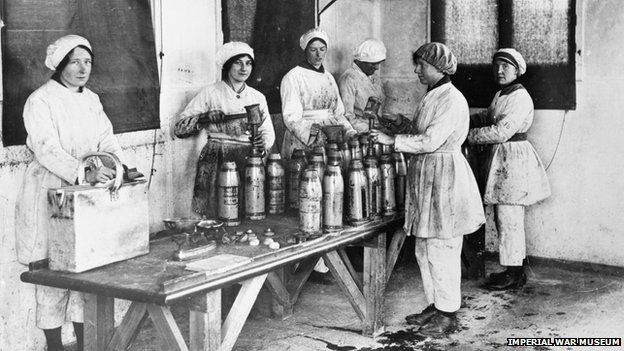World War One: The risks for women on the home front
- Published

Far away from the frontline, many of World War One's victims were women. Wives, girlfriends, mothers and sisters of troops often found themselves in high risk jobs at munitions factories, which were prone to deadly accidents.
The pupils at St Peter's Primary School in Ashton-under-Lyne are well aware of those stories from a century ago, as they rehearse their chorus over and over.
"Stay happy with your lives, but don't forget about the past," they sing, striving for perfection.
The choir is preparing for performances of the musical Blast, written by their teacher Mark Derbyshire. Blast tells the story of the 46 locals, many of them women, who were killed in an explosion at a TNT factory in 1917, just minutes from the school.
On 13 June that year, Hooley Hill Rubber and Chemical Works, standing yards from two gas storage tanks, caught fire and erupted within minutes.
"One of the crazy things is that the government at the time allowed a TNT factory in the middle of an urban area right next to two gasometers," Mr Derbyshire said.
"The building itself wasn't designed as a munitions factory, it was a converted mill and one of the major problems was the floors were wooden and obviously having nitric acid (TNT ingredient) near wood is very dangerous.
"The walls of the building didn't go right to the very top so any fire that started could spread very rapidly. The owners of the factory knew this and did everything they could to get these modifications done."
It is unlikely however, any changes could have stopped the disaster.
Five tonnes of TNT became unstable and the factory was ablaze within minutes. A horse-drawn fire tender was sent but could do little to calm the flames. Seven children from St Peter's were killed, some as they made their way home school.
Historian Alan Rose said there was a "mass funeral" with "more than 40 hearses lined up outside the town hall".
He acknowledges however, that while a sculpture now commemorates the dead there was a long period when local people "forgot" about the disaster.
Events happening away from the frontline were "pushed to the back of people's minds".
"Most of the victims, of course, were women. The majority of the workers in the factory were women," he explained.
'Canary babies'
Elsewhere, thousands of women and girls from around West Yorkshire worked at the Barnbow plant near Leeds where 37 women were killed in three separate explosions, between 1916 and 1918.
A memorial garden was eventually built to remember the tragedies of the 'Barnbow Lassies' after details of their deaths were kept secret until the war ended.
For some of the "munitionettes", as they became known, working in close proximity to TNT also had a startling effect on their children.
Gladys Sangster, now aged in her late 90s, was born while her mother was working at National Filling Factory Number 9 near Banbury, Oxford.
"I was born when the war was still on and my skin was yellow," she said. "That's why we were called canary babies.
"Nearly every baby was born yellow. It gradually faded away. My mum told me you took it for granted, it happened and that was it."
Dale Johnston, events and exhibitions manager at Banbury Museum, said: "Gladys' mother had been working with the chemicals at the factory.
"Many people will have had babies with jaundice, but this is chemically-induced yellow colouration of the skin."
The canary effect was replicated at other factories around the country and in some plants certain staff were paid danger money.
'Ladies of ill repute'
At the Kynoch factory in Corringham, Essex, women mixed and prepared the explosive that was then sent on to the munitions depots.
Jonathan Catton, curator of Thurrock Museum, said a minority of the employees there were prostitutes, who opted to take a job rather than go to jail.
"Ladies of ill repute who found themselves in the courts were given this opportunity to either go work for their country, or go to prison," he said.
"In Thurrock, there was increasing prostitution because so many soldiers were barracked nearby and the magistrates, allegedly, were giving women the option of going to work in these factories."
Most of the 4,000 staff were proud of their role in the war effort. There was certainly no doubting the risks they faced.
"Some of those ladies were paid extra because they were working in the most dangerous parts of the factory," Mr Catton said. "It was probably more dangerous than firing a gun, in a sense."
- Discover how a Grimsby factory supplied jam to the frontline and hear from Kate Adie on what WW1 really did for women.
- Published18 September 2005